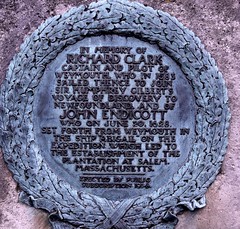John Endicott


John Endicott
(1558-1665)
Father of New England, 1st Governor of the Massachusetts Bay Colony (1629-1630), 10th Governor of the Massachusetts Bay Colony (1644-1645), 13th Governor of the Massachusetts Bay Colony (1649-1650), 15th Governor of the Massachusetts Bay Colony (1651-1654), and 17th Governor of the Massachusetts Bay Colony (1655-1664)
Commemorated on 1 plaque
In memory of Richard Clark Captain and Pilot of Weymouth, who in 1583 sailed thence to join Sir Humphrey Gilbert's voyage of discovery to Newfoundland, and of John Endicott who on June 20, 1628, set forth from Weymouth in the ship "Agibail" on the expedition which led to the establishment of the Plantation at Salem, Massachusetts. Erected by public subscription in 1914.
The Clark / Endicott Memorial near Custom House Quay, Weymouth, United Kingdom where they set forth (1627)

